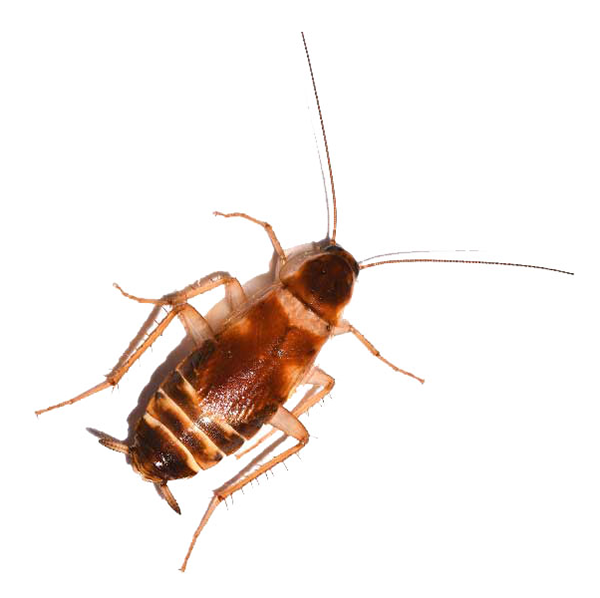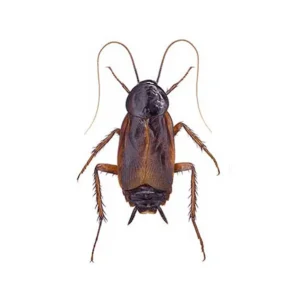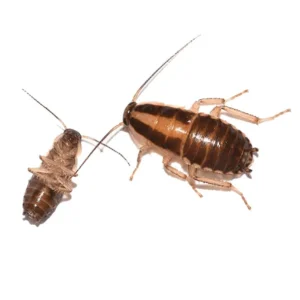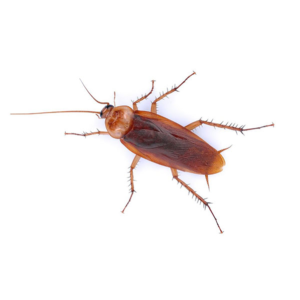Identify Brown-Banded Cockroaches
Brown-Banded Cockroaches in North Carolina
The name “brown-banded cockroach” comes from the pronounced bands of color across the wings of adults and bodies of nymphs. In North America, the brown-banded cockroach is thought to be present in most states and lives in buildings that maintain relatively high temperatures. This cockroach is similar to the German cockroach with its small size and body shape but can be distinguished by its lack of two dark stripes.
Both brown-banded and German cockroaches are obligatory domestic roaches, which means they do not live outside and rely solely on conditions created in our homes and buildings for survival. The brown-banded cockroach is sometimes referred to as the “furniture cockroach” because it is distributed evenly throughout households, including non-food locations, such as bedrooms, under chairs and tables, and behind pictures and other objects on walls.
Brown-Banded Cockroach Habitat
Brown-banded cockroaches prefer warmth and tend to be found up and away from the floor in closets or in heat-generating appliances. Brown-banded cockroaches are good climbers and can be active at night and during the day. Females seek out warm, dark places where they can attach their yellowish-brown egg capsules, and prefer walls, ceilings, tables, bedding, or furniture. Brown-banded cockroaches feed on a variety of materials including human food, starches, dyes, glue, books, stamps, and clothing.
Brown-Banded Cockroach Behaviors, Threats, or Dangers
Brown-banded cockroaches are not aggressive and do not bite. These roaches reproduce at an alarming rate and one female can produce up to 600 young in her lifetime. These nocturnal insects are not only unsightly but can also pose health risks for humans. They can contaminate food and surfaces with bacteria, exacerbating allergies and asthma in sensitive individuals. Furthermore, they have the potential to transmit diseases and pathogens through their excrement and shed skin.
Brown-banded cockroaches are known to spread at least 33 different kinds of bacteria, making them a concern for any homeowner. Foraging cockroaches can be vectors of disease, depositing germs or bacteria in areas they inhabit and causing asthma attacks in some people sensitive to cockroach allergens. E. coli and Salmonella are both commonly spread by brown-banded cockroaches and can cause gastroenteritis and diarrhea.
If you suspect a brown-banded cockroach infestation, contact a professional cockroach exterminator for help.
What are Brown Banded Roaches Attracted to?
Brown banded cockroaches are attracted to food sources such as crumbs, grease, and even pet food left out in the open. They are also drawn to warm and dry environments, making human habitations an ideal shelter for them.
Where Do Brown Banded Roaches Lay Eggs?
Unlike some other species of cockroaches, brown banded cockroaches don’t necessarily lay their eggs near food sources. Instead, they prefer to deposit their egg cases in warm secluded areas like behind furniture, in cracks and crevices, or even inside electronics. This makes finding and eliminating their eggs a significant challenge.
FAQs
How do you treat brown-banded cockroaches?
Treating brown banded cockroaches requires a comprehensive approach that includes both chemical and non-chemical methods. Professional pest control services often employ a combination of insecticides, baits, and insect growth regulators to target both adult roaches and their eggs. Additionally, preventative measures can help tackle the issue with thorough sanitation and sealing of entry points are essential to prevent reinfestation.
Are brown banded roaches bad?
Yes, brown banded cockroaches can be a problem for homeowners and businesses are they are a potential health hazard as they infest homes and businesses. While they may not carry as many pathogens as some other species of cockroaches, their presence can still lead to contamination of food and surfaces, as well as allergic reactions in sensitive individuals. Prompt action should be taken to eliminate them once they’re detected with the help of professional cockroach exterminators.





